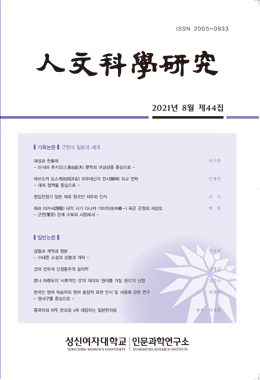본고는 제1차 세계대전 종결을 전후하여 육군과 국민과의 관계가 동요하는 가운데, 하라 다카시(原敬) 내각의 육군대신으로 취임한 다나카 기이치(田中義一)가 군민 관계를 어떻게 수복하고자 하였는가에 주목하여 그가 추진한 군정의 동기와 내용 등을 재검토한 것이다. 러일전쟁 이후 다나카는 일관되게 군민 일치의 필요성을 호소하였지만, 1차대전 종결 직전에 발발한 쌀소동 및 독일의 혁명과 패배에 그는 위기감을 품게 되었다. 또한 전쟁 종결 직후에는 물가 급등에 의한 생활난으로 인해 현역·재향 군인이 사상적으로 동요하고, 또 파리 강화 회의에서 징병 제도 철폐 문제가 논의되면서 육군 및 징병 제도에 대한 국민의 비판이 제기될 것이 우려되었다.
이에 다나카는 현역·재향 군인의 생활을 안정시킴으로써 그들의 사상적 동요를 막기 위해 급여·은급을 대폭 인상하고 군사 원호 단체 설립에 직접 관여하였다. 또한 국민의 병역 부담을 가볍게 하기 위해 군대내무서·군대교육령을 개정하여 병영 내 병사의 대우 개선을 꾀함과 동시에, 기존의 보병뿐만 아니라 거의 모든 병과에 대해서도 2년 재영 제도를 확대 실시하였다. 이러한 군정은 그가 실무를 맡은 러일전쟁 이후의 육군 개혁과 방향성이 일치하는 것이었다. 또한 이 과정에서 참모본부나 야마가타 아리토모(山縣有朋) 등의 반대를 물리쳤을 뿐만 아니라, 소요 예산 획득을 위해 대장성과의 대립도 불사하고 하라를 설득하는 등 그의 적극성이 눈에 띈다. 이 점에서 군비 근대화 이상으로 군민 관계 수복에 대한 그의 의욕을 엿볼 수 있다.
This article reexamines the motive and contents of Minister of War Tanaka Giichi's army reform in Hara Takashi Cabinet, focusing on his effort to recover civil-military relation in Japan, when the relation was wavering before and after the end of the First World War. After Russo-Japanese War, he had consistently emphasized the necessity of civil-military cooperation. However, he felt danger from the outbreak of Rice Riots(Kome sōdō) just before the end of the First World War, and from the revolution and defeat of Germany. And after the end of the War, he worried that active-duty soldiers and reservists might be shaken ideologically by living difficulties, and national criticism toward the army and its conscription system might be provoked by the conscription abolition issue in Paris Conference.
Accordingly, in order to prevent active-duty soldiers and reservists' ideological problems by stabilizing their livings, Tanaka raised their salaries and pensions drastically and took a direct part in foundation of military assistance organizations. And to reduce national burden of military service, he tried to improve treatment to soldiers in barracks by revising army handbook of standing orders(Guntai Naimusho) and army education ordinance(Guntai Kyōikurei), and shortened the period of active service to 2 years not only for infantry, but also for almost all branches. This reform shared direction with previous one, in which Tanaka had taken part as a member of working group, after Russo-Japanese War. And he showed his positiveness, not only by dismissing oppositions from Army General Staff Office(Sambōhonbu) or Yamagata Aritomo, but also by colliding with Ministry of Finance(Ōkurashō) or persuading Prime Minister Hara to acquire necessary budget. This shows his will to recover civil-military cooperation, more than to modernize the army.


